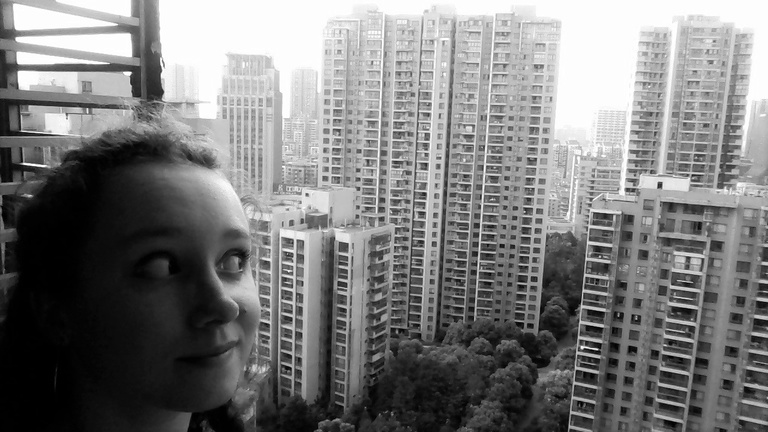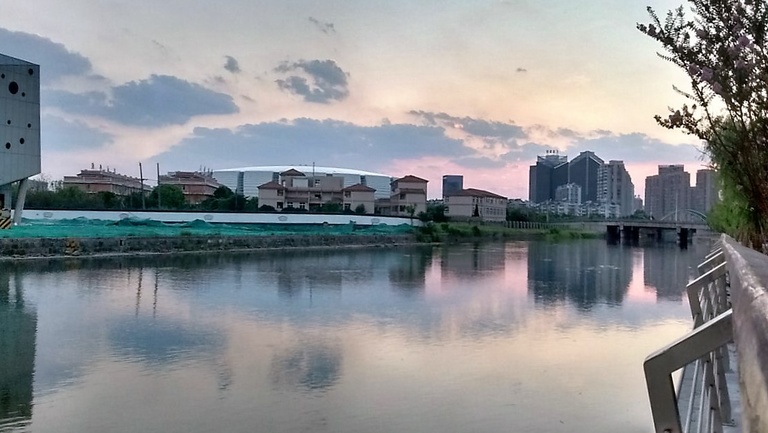
By Astrid Montuclard*
Seated in the living room of my apartment, 23 stories above the ground, I am watching shapes of light dancing in random movements on the beige wall facing me. Beams of light are coming from the 30-story business building a couple streets away, illuminated through the night to distract the thousands of people living in the dozens of identical skyscrapers surrounding the area. Taking a deep breath, I savor the feeling of being in the so-called “paradise on earth”: Hangzhou, China, where the population of almost 10 million people is twice the number of Finland’s, my mother’s country (Tip #1: Before your trip to China, get prepared to never, ever be alone again). Despite the incredible number of neighbors I have, hardly any noise is passing through the open window behind me; only the shy songs of crickets and attenuated sounds of engines can be heard, brought in by the fresh wind of the night. The G20 has been putting the city to sleep for the past two days and will continue to do so until the 9th.
My closest neighbors are now quiet, I cannot hear them speak in their local dialect anymore. During the day, when their front door is left wide-open to let the wind cool the apartment, I can never understand their conversations; much sharper-sounding than the “common language” or “普通话” (Mandarin), their “方言” or “local language” differs widely from the Chinese I have learned in school. In fact, most Chinese people, including our international students in Iowa, are bilingual: they speak both their local dialect and Mandarin. I exchanged a couple words with my neighbors upon my arrival to the apartment building last Saturday. I can claim without hesitation that every second I spent learning Mandarin over the past eight years was not a waste of time (Tip #2: Always pay attention in class and do your homework. Just always, period.).
On Saturday, when I arrived to Hangzhou and after failing to open the door to my friend’s apartment, I remained on the doorstep and started reading a book which I had bought at the Charles De Gaulle Airport in Paris. Reading in French was helping me cope with the nostalgia of leaving Europe where I had visited my dad’s French family and my mum’s Finnish family over the summer (Tip #3: Don't wait until you get to the airport to realize you won’t have your favorite books or brands of candy for a year. Bring stocks from home, it’s cheaper).

After a couple minutes of reading, one of my neighbors-to-be came out of her apartment and started inquiring about me sitting in the dust. She gave me a little stool, a bottle of water, and finally offered to let me give my friend a call, which I did before successfully entering the apartment where I would stay until the 8th. I was relieved. (Tip #4: Never forget to help your Chinese benefactor in return at some point, if you can. In China, reciprocity is not an option, it’s a social rule).
Earlier that day, within a couple hours upon my arrival, I had already understood that one cannot survive in China without a phone. As I was miserably carrying 120 pounds of luggage in the streets of Hangzhou where most Chinese walkers stopped a second to watch me, I got lost and asked several young Chinese guards at the entrance of a residence for directions (Advice #5: In China, if you are not Asian-looking, be prepared to be looked at every time you step out of your home. You are more exotic than you think). The five guards surrounded me, surprised to hear me speak in Mandarin. Most Chinese people, despite the rapid globalization of their country, are still impressed when a Western youngster can speak their native language. I blushed a little as I knew my speaking level was far from where it should have been; I had spent the whole summer studying for the Medical College Admission Test and had not spoken a word of Mandarin for three months (Tip #6: Keep studying the language of your host country during the holiday preceding your study abroad trip).
Nonetheless, one of guards allowed me to call my friend with his mobile phone. Such a gesture may seem commonplace for Americans who are used to unlimited phone call plans. However, giving a mobile phone call in China can cost a substantial amount of money to the telephone owner, just like in Tahiti, the French Polynesian island where I grew up (Tip #7: If needed, ask for a phone to a wealthy-looking adult, not a young or elderly individual for whom a phone call may cost more comparatively). Grateful for his offer, I said I would pay him. He refused. As I was finishing my call, a car approached and I soon realized that before giving me his phone, the same guard had called a taxi through an app similar to Uber.
I was amazed and thankful again, but also expressed wariness; the car did not have any taxi signs on its roof and I feared that the taxi-driver would ask me for three times the price of a normal ride, as it often happens to unexperienced tourists (Tip #8: When you get into a taxi, state that you’ll want a receipt at the end of the ride to avoid paying more than you should). “别担心!” –“Don't worry!” the guard kept repeating as I was inquiring how much the ride would cost. Astonished, I realized that he had paid for my taxi ride through the app on his phone. I protested. “你是客家,” he said with a smile, opening the door of the car. “You are a guest,” he had said. I was truly amazed by such generosity, which reminded of Polynesian people’s willingness to help, back home. “This is Hangzhou hospitality,” my friend told me later, visibly amused by my surprise. Herself being from Hangzhou, she had accepted to host me for two weeks, after I had told her in panic that all hotels were booked for the G20. She was an example of hospitality herself.
Later at night, lying in my bed which was hard like a rock (Tip #9: Be prepared for hard mattresses, they are commonplace in China), I thought: “I grew up in Tahiti where people are the friendliest on Earth and moved after high school to a US state known for its “Iowa-nice atmosphere. Now, I am studying abroad in a city where people treat me like a guest and are known for their hospitality… How can someone reproach me ever again to have faith in the human capacity for goodness after this??”
(Tip #10: Be grateful, for everything, all the time).
*Astrid Montuclard is a guest blogger studying Pre-Med at the University of Iowa. An international student born in France and raised in Tahiti, she came to the UI to run track and now spearheading a new awareness campaign on campus, True@TheU, which raises mental health awareness and will be launched this fall.
Student blog entries posted to this International Accents page may not reflect the opinions and recommendations of UI Study Abroad and International Programs. The blog is intended to give students a forum for free expression of thoughts and experiences abroad in a respectful space.